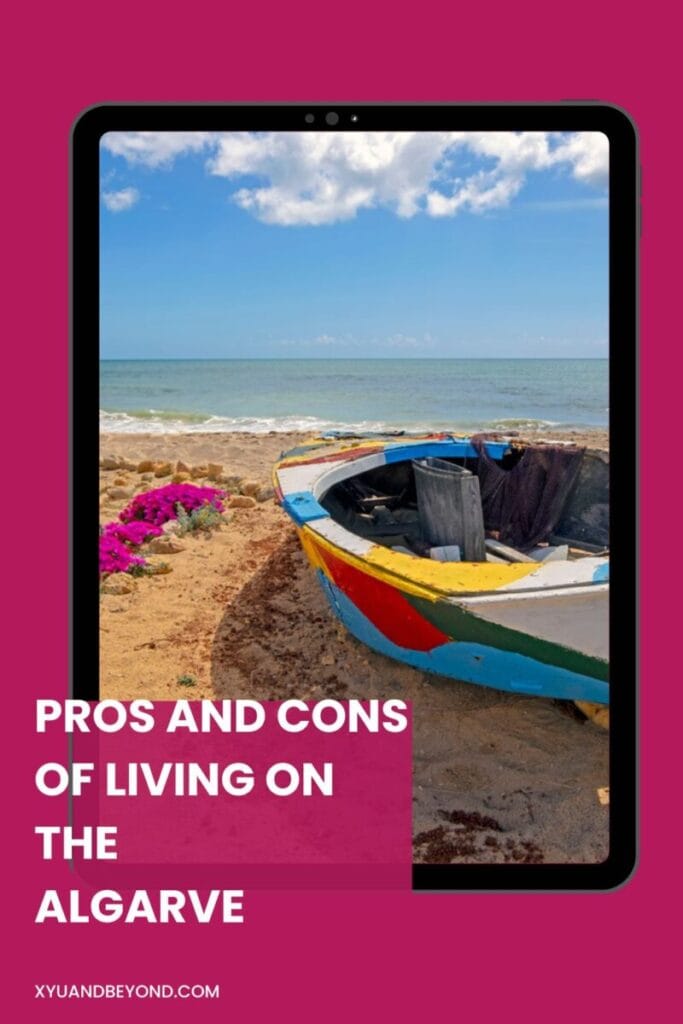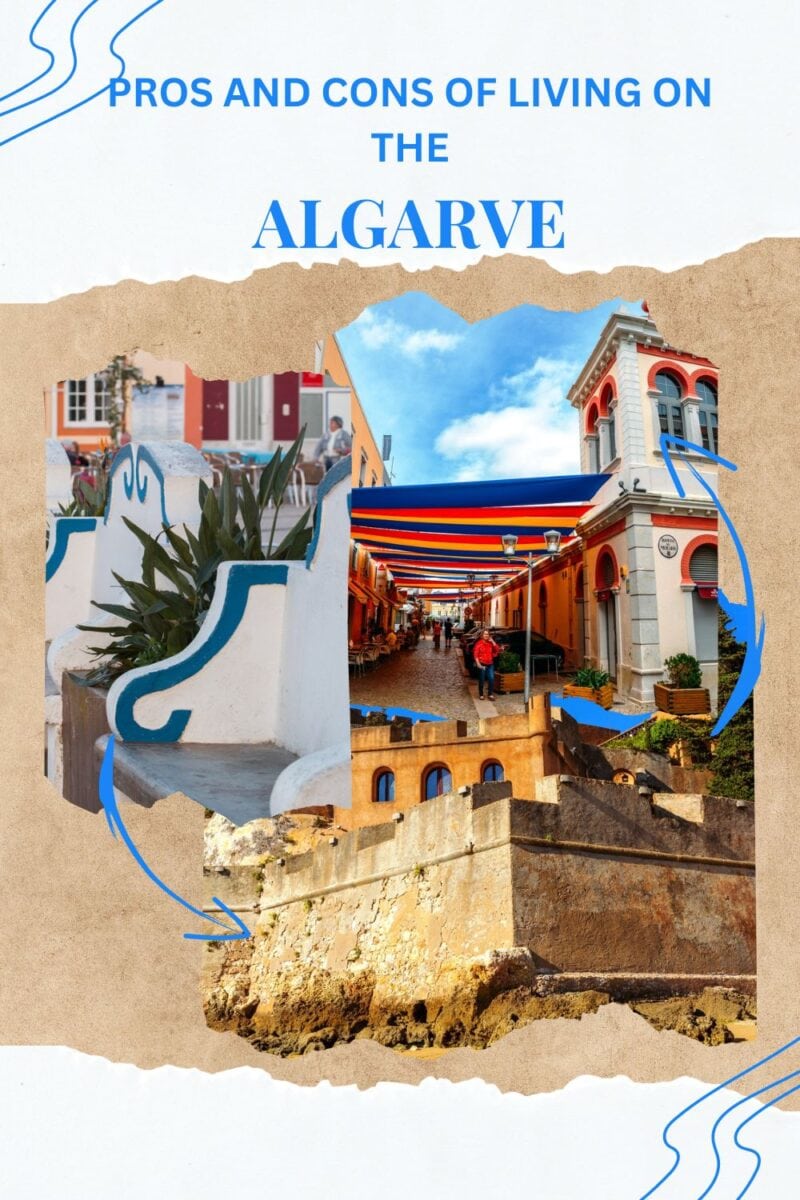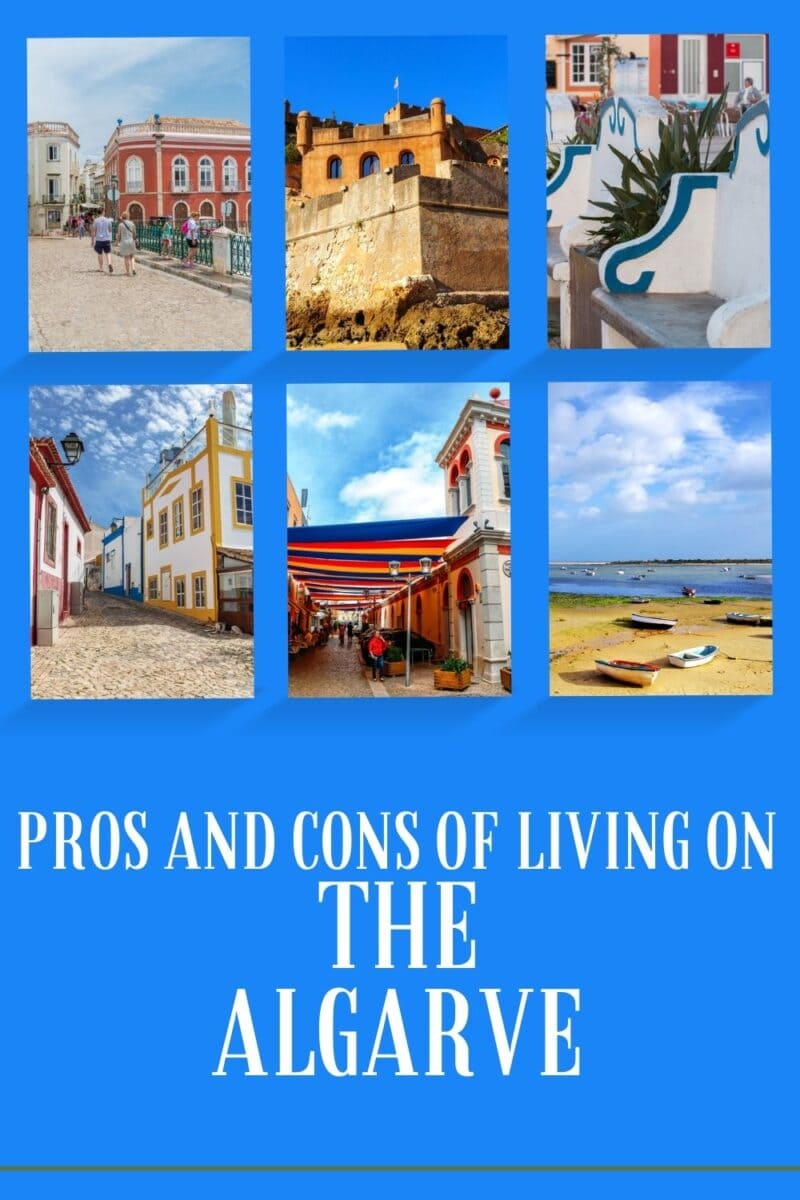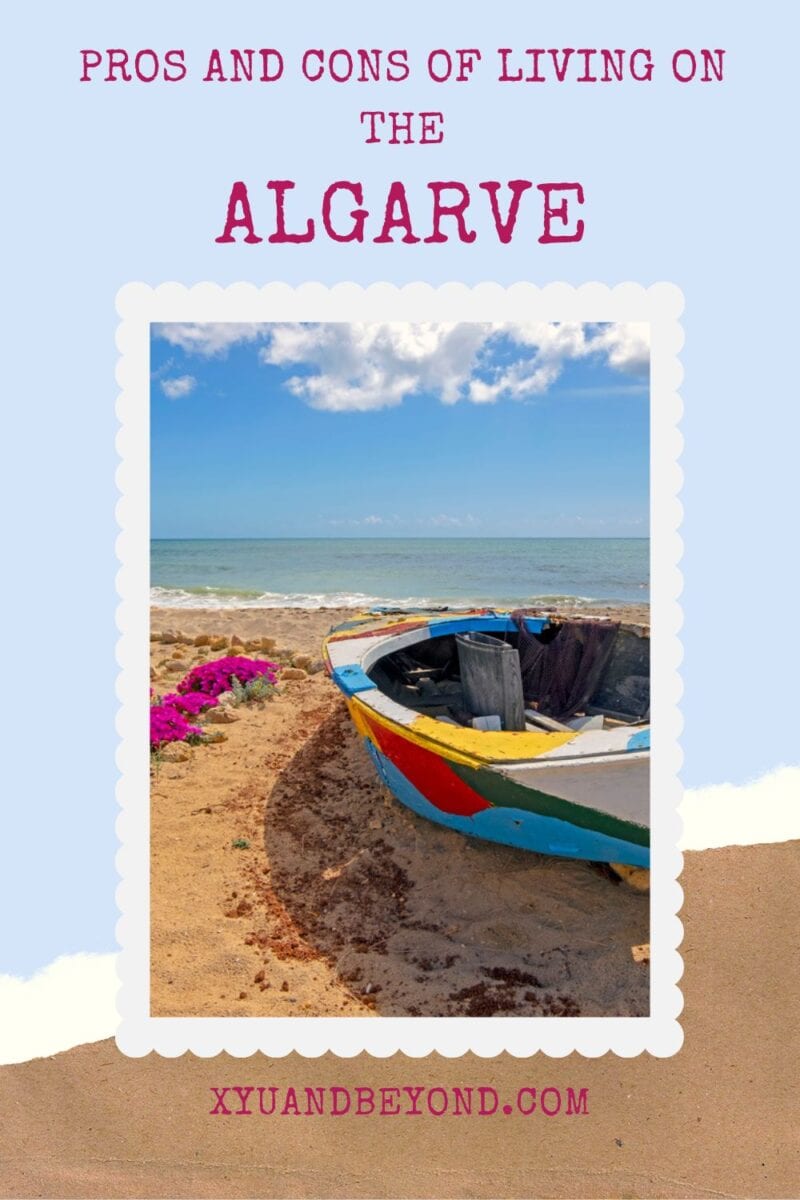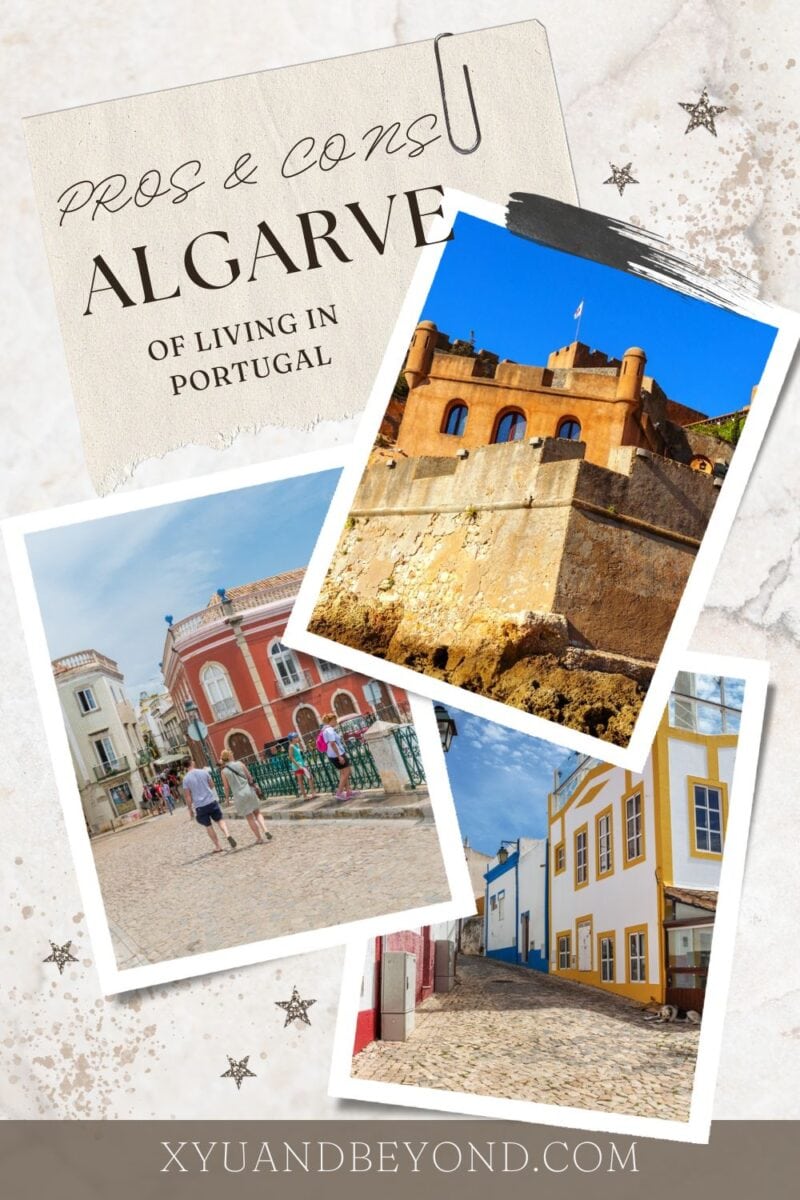Pros and Cons of Living in Portugal: On the Algarve
Moving to the Algarve had never been on our radar. In fact, until a year before we moved here, we had never even been to Portugal.
As an Irish expat family living in Wales for 15 years, we favoured Spain over Portugal for our summer getaway in the sun and Portugal just never factored into it. We debated the pros and cons of living in Portugal after my parents moved there. English is widely spoken in Portugal, particularly in the Algarve, and cities like Lisbon, and Porto. In other parts of Portugal, English is less widely spoken but it still won’t take long to find someone that speaks English. Portugal is one of the safest countries in the world and there are many pros of living in Portugal. Portugal ranked among the top 5 countries for expats — 84% of those who moved to the country were satisfied with their lives.
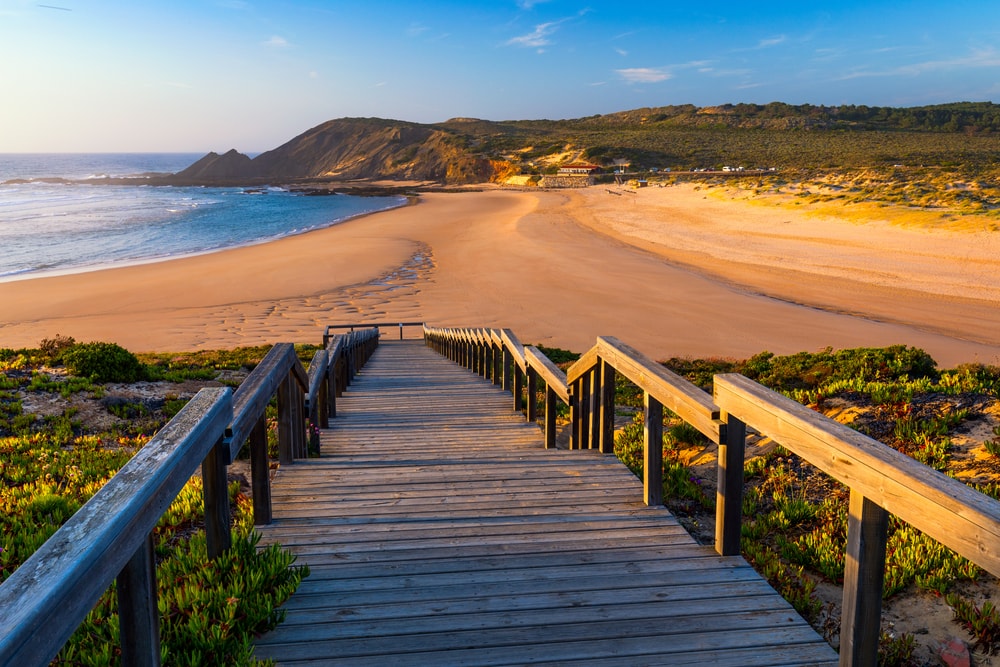
However, my parents had been holidaying in Portugal twice a year for several years. In the 1990’s my father worked on a mine in Angola and as a result worked alongside many Portuguese and Brazilian people, Angola being a former colony of Portugal.
This meant he wanted to travel to Portugal as he knew a little bit of the language and culture and was aware of the favourable cost of living in Portugal.
In 2016, my parents took their regular March holiday to Portugal, spending one week in the Algarve and one week near Lisbon. I got the opportunity to go with them for a few days in the Algarve and went with my son. It was my first time visiting Portugal. It felt like Spain, and I enjoyed the time with them.
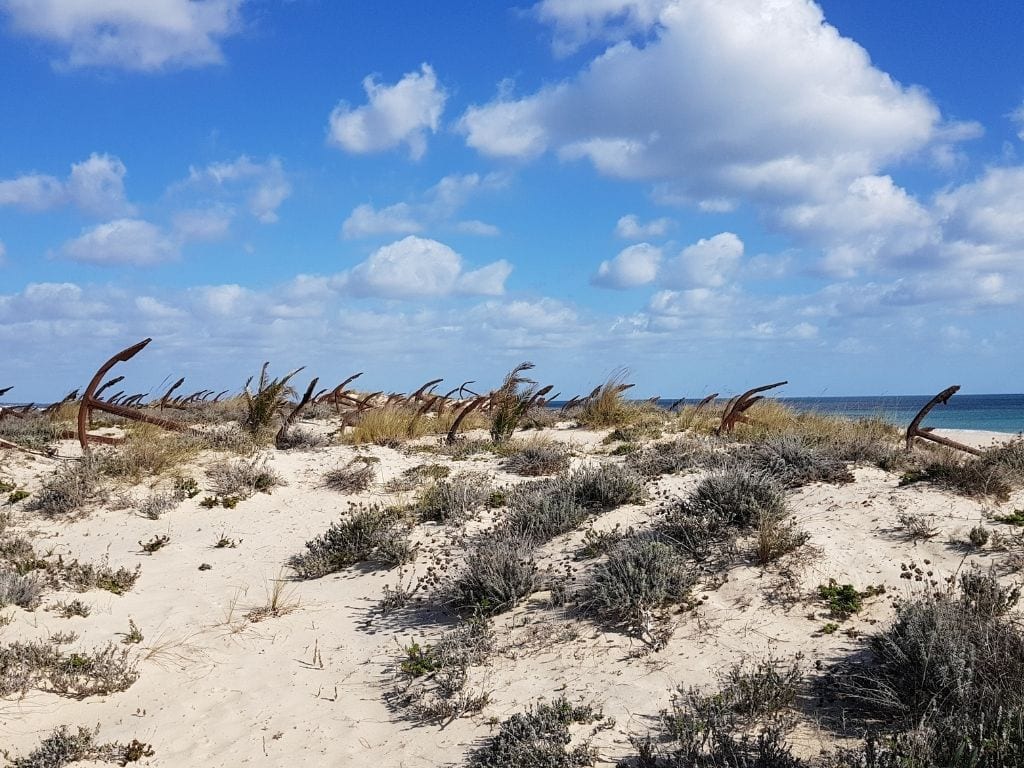
Fast forward a few months and with my Mum finally thinking about retiring, they bought a three-bedroom mobile home on a park and made their announcement in the September that they were retiring there.
We had kept the first house we bought in Wales and shortly after my parents bought their place, we decided to sell that house and buy our own holiday place in the sun.
However, holiday talk soon turned to the possibility of moving permanently and before we knew it, we were clearing out our home, deciding what was coming and what was being sold.
We also decided to buy a mobile home on a different park as a temporary measure, to try out Portugal for two years and see if we liked it enough to stay longer. Most of our belongings would go into storage until we decided to either buy a house or move on.
It took us six months from making that decision to landing in Portugal and we arrived in May 2017.
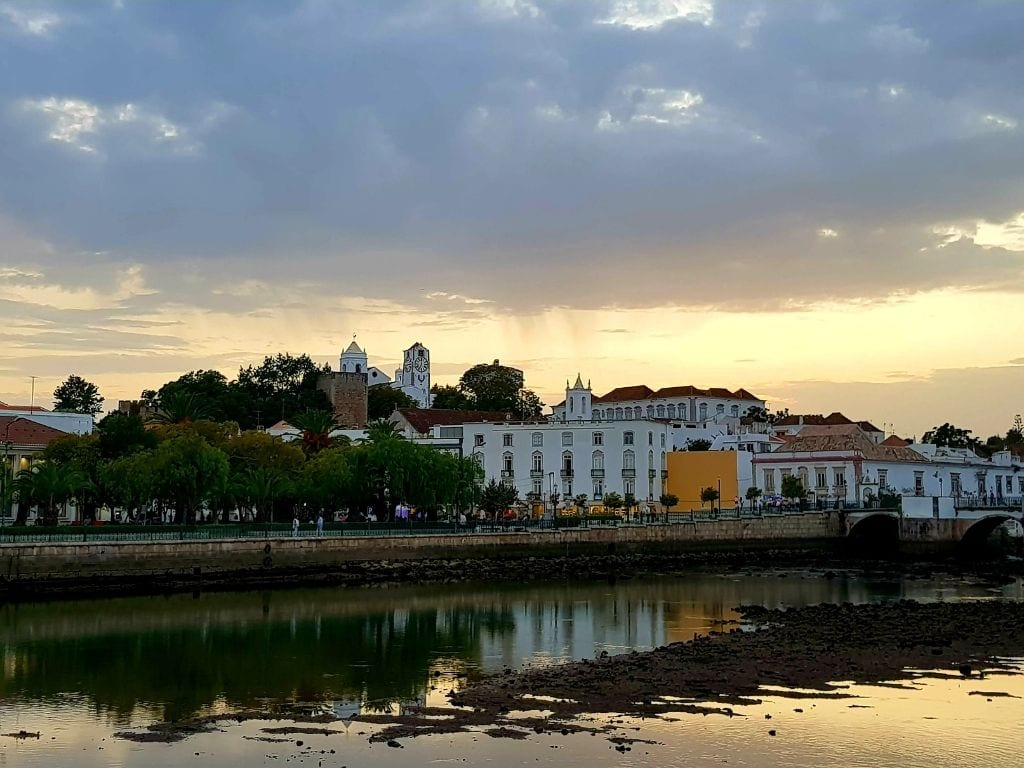
We have discovered good things and bad things to living in Portugal and below you’ll learn some of the pros and cons of living in Southern Portugal in the Algarve region that we as Irish expats have experienced.
Frequently Asked Questions: Pros and Cons of Living in Portugal
1. What are the advantages of living in Portugal as an expat?
Living in Portugal as an expat offers numerous benefits. The country provides a relatively low cost of living compared to other European nations, along with a pleasant quality of life and a slower pace of life. Additionally, English is widely spoken in many areas, making it easier for expats to communicate and integrate into society.
2. What are some disadvantages of living in Portugal?
While there are many advantages, it’s important to consider the disadvantages as well. The main cons of living in Portugal may include challenges related to relocating, potential language barriers, and adapting to a new culture. Expats may also face differences in living cost and social norms compared to their home country. Navigating the bureaucracy is, unarguably, one of the main downsides of living in Portugal as an expat.
3. Is the cost of living in Portugal affordable for expats?
Portugal offers an affordable cost of living for expats, especially in comparison to many other Western European countries. With a relatively low cost of living, expats can enjoy a comfortable lifestyle without breaking the bank. From housing to everyday expenses, Portugal provides a good balance of affordability and quality.
4. What are the benefits of living in Portugal in 2024?
In 2024, Portugal continues to be an attractive destination for expats due to its relatively low cost of living and quality of life. The country’s residency programs, such as the Portugal Golden Visa program, offer additional incentives for those looking to establish long-term roots in this beautiful European nation.
5. What are the Best places to live in Portugal as an expat?
If you are thinking of moving to Portugal these are some of the best places to live: Porto, Braga, Aveiro, Coimbra, Lisbon, and the Algarve.
6. How is the average salary in Portugal?
The average salary in Portugal can vary depending on the industry and region, but overall, it
- Pros and Cons of Living in Portugal: On the Algarve
- Frequently Asked Questions: Pros and Cons of Living in Portugal
- 1. What are the advantages of living in Portugal as an expat?
- 2. What are some disadvantages of living in Portugal?
- 3. Is the cost of living in Portugal affordable for expats?
- 4. What are the benefits of living in Portugal in 2024?
- 5. What are the Best places to live in Portugal as an expat?
- 6. How is the average salary in Portugal?
- Pros and cons of living in Portugal – the Algarve
- Pros of living in the Algarve
- Climate
- Friendliness of the locals
- Large expat community
- Safety
- Relaxed Pace of Life
- Outdoor Living
- The Beaches
- Festivals
- Food
- Coffee
- Location in the Schengen
- Quality of education in Portugal
- Rich Cultural Heritage
- Affordable Cost of Living
- The Opportunity to travel within Portugal
- Greater use for a summer wardrobe
- Cons of living in the Algarve
- Language – English is widely spoken but….
- Public Health Care
- Work Opportunities
- Taxes on wages in Portugal and the Portuguese tax regimes.
- Tourists
- Driving in Portugal
- Cost of cars
- Customer Service
- Cost of Housing
- Transportation in the Algarve
- Portuguese Bureaucracy and Public Services
- Portuguese winter months
- Getting a Portuguese Visa
- Was it worth it moving to the Algarve?
- Frequently Asked Questions: Pros and Cons of Living in Portugal
Xyuandbeyond is reader-supported. When you buy through links on our site, we may earn an affiliate commission. You can read my privacy policy here.
Pros and cons of living in Portugal – the Algarve
Pros of living in the Algarve
Climate
Obviously one of the advantages of living in Portugal is the weather. Most people move to the Algarve for the climate. While yes, the summers do get hot, sometimes hitting 40C, for most of the summer, the heat is manageable and far less intense than the Alentejo or Central regions of Portugal.
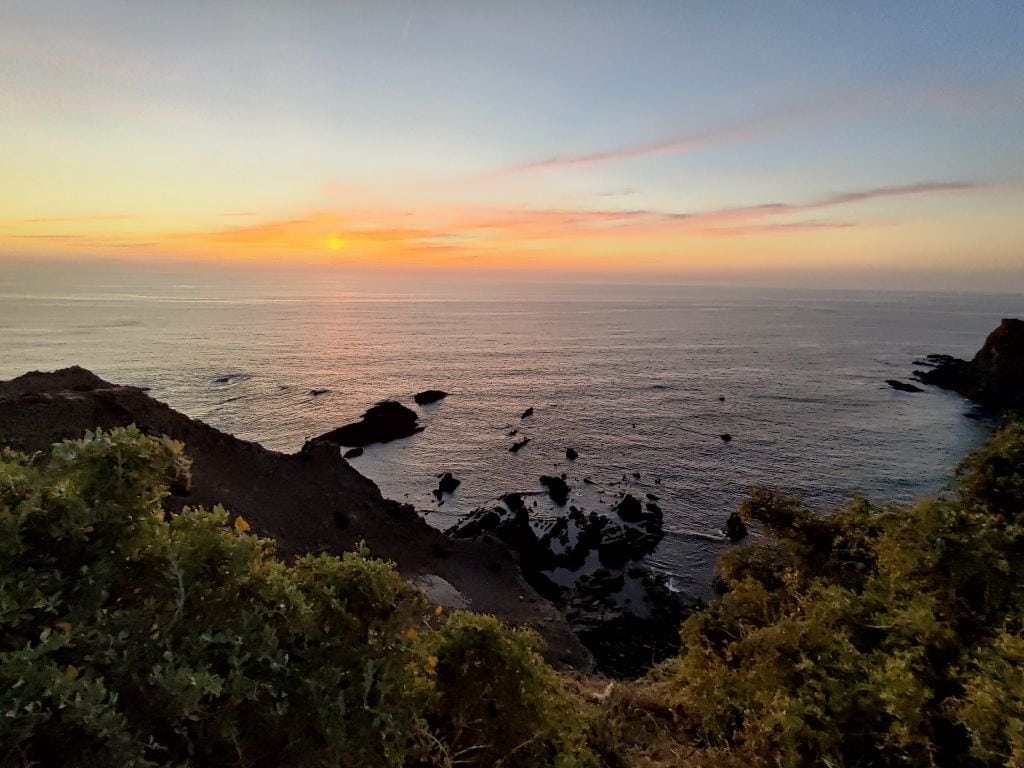
Winters do get cold, relatively speaking, and in January, morning temperatures can be as low as 6C, but during the daytime they rise to an average of 16C or more. Far better than the temperatures in Ireland, which I must admit, I find hard to deal with when I return to Ireland for visits, especially outside of the summer.
Most mornings we wake up to dry ground and blue skies overhead, something we hardly ever got while living in Ireland or Wales (where we moved from).
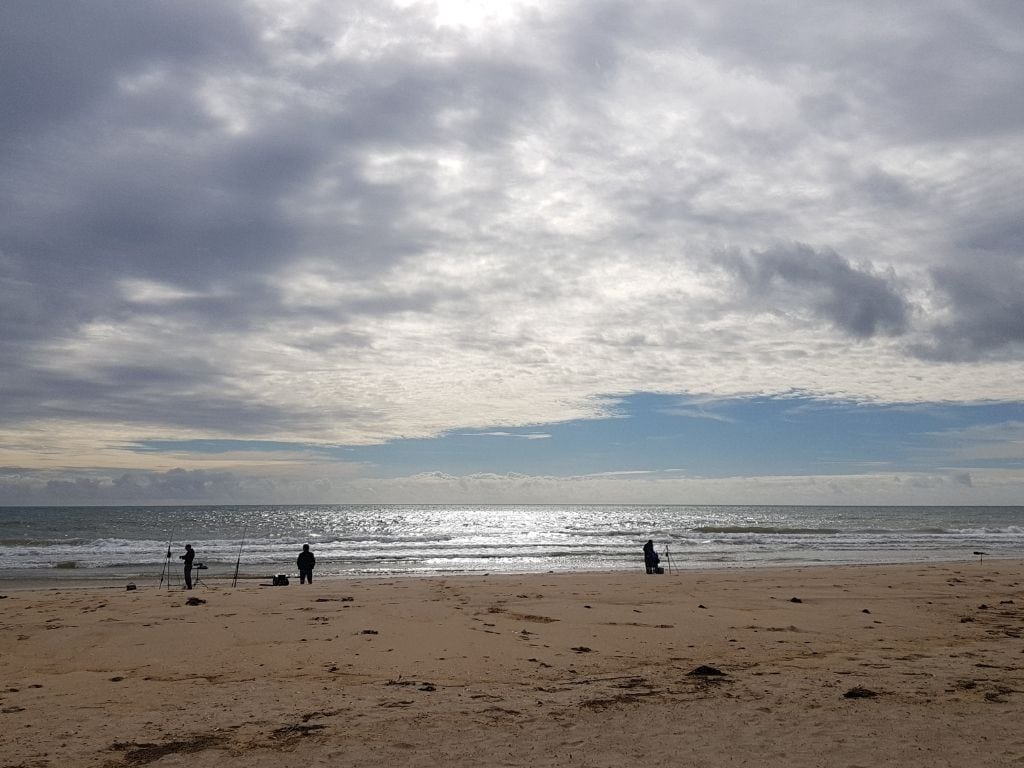
We do get rain but not as much as the north. We have neighbours who moved from Porto 20 years ago to escape the rain in winter.
But the climate is a big factor. It was one of the many reasons we left Wales. We realised that our then 3-year-old had spent more than two-thirds of his life indoors because of the cold, wind, and rain.
Friendliness of the locals
One thing we have found is that the Portuguese people are very friendly. Even more so when we try and speak the language (more on that further below).
We have had a hairdresser try and help us get our son enrolled into the local primary school with one phone call. We’ve had my Portuguese teacher do translation for us during early meetings with the school child psychologist.
We have the local postman at the post office giving us language lessons and history lessons in both English and Portugues. We’ve had people walk us from one place to another just to show us the way. And all of this from cobbling together our early Portuguese (things are easier now).
Honestly, we find the locals some of the friendliest people in the world.
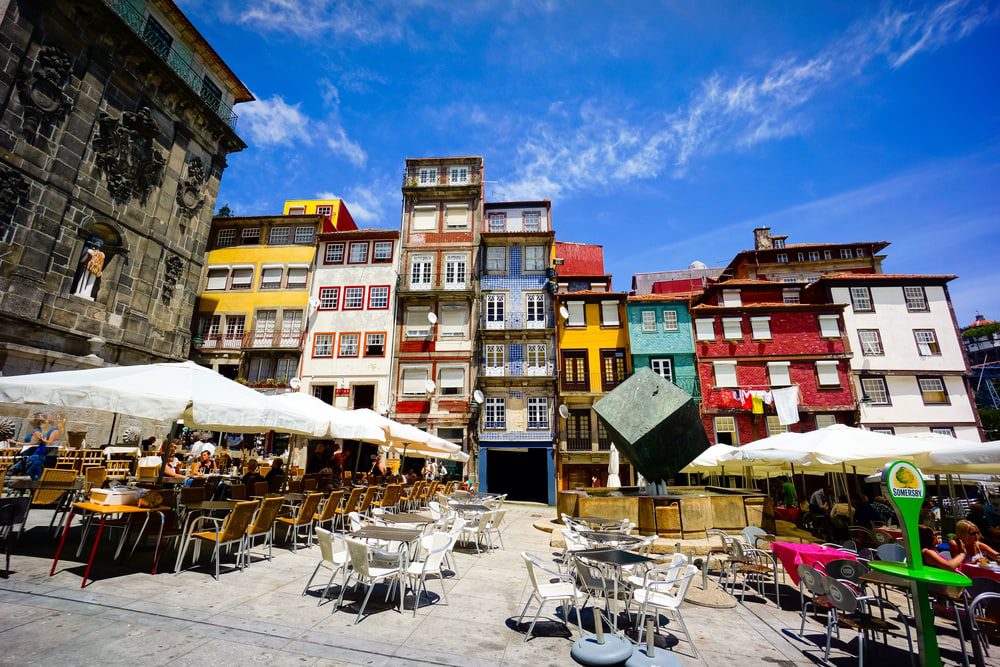
Large expat community
For expats in Portugal moving to the Algarve and seeking a new adventure and an improved quality of life are the main reasons for moving to Portugal. According to the latest Global Peace Index 2023, Portugal has been ranked as the 7th most peaceful country in the world.
The large expat community in Portugal is made up of individuals from various countries who have chosen to make Portugal their home. Living in Portugal offers many benefits, including a low cost of living, stunning landscapes, a vibrant culture, and a laid-back lifestyle.
Many expats are drawn to the country’s warm climate, beautiful coastlines, and delicious cuisine. In addition, Portugal has also been attracting foreign professionals who are looking to work in a growing economy.
With its thriving start-up scene and attractive tax incentives for entrepreneurs, Portugal has become a hub for innovation and business opportunities. Overall, the large expat community in Portugal is proof of the country’s appeal as a destination for both living and working.
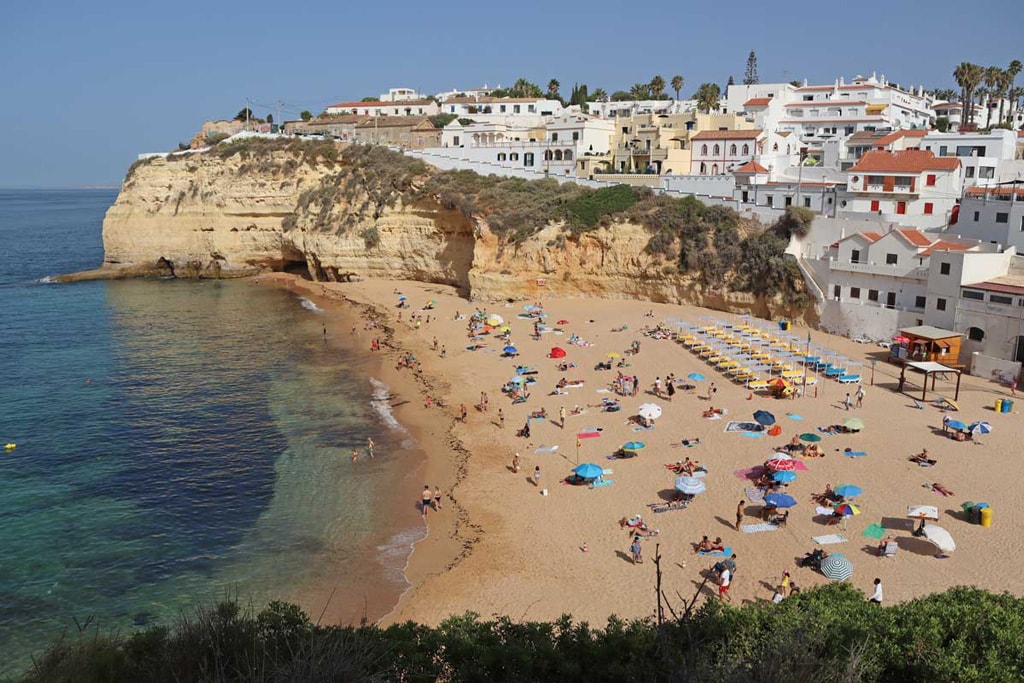
Safety
Portugal is considered a pretty safe country. It has a low crime rate than other European countries and I think the Algarve is safer than Dublin across the board.
Yes, there are crimes that can and do happen just as they do everywhere else. But we have felt far safer living here than we have anywhere else for many years before.
We’ve seen young girls walking alone at night, something you wouldn’t do in certain parts of Wales or Ireland. People often leave their doors unlocked during the day, another thing you simply wouldn’t do in the area of Dublin I am from.
A big factor for US citizens moving to Portugal is the minimal gun crime experienced. Another neighbour of ours moved from the US to the East Algarve a year ago and gun crime was one of the biggest factors for them.
Relaxed Pace of Life
There are many benefits of living in Portugal and for us the best of living on the Algarve is the slower pace of life. We sometimes joke that Portugal, and the Algarve in particular, is like living in Ireland 30 years ago.
There is no rush to get things done. In fact, if a company says they will arrive between 10am and 12pm tomorrow, we are taken by surprise when they show up when they say they will.
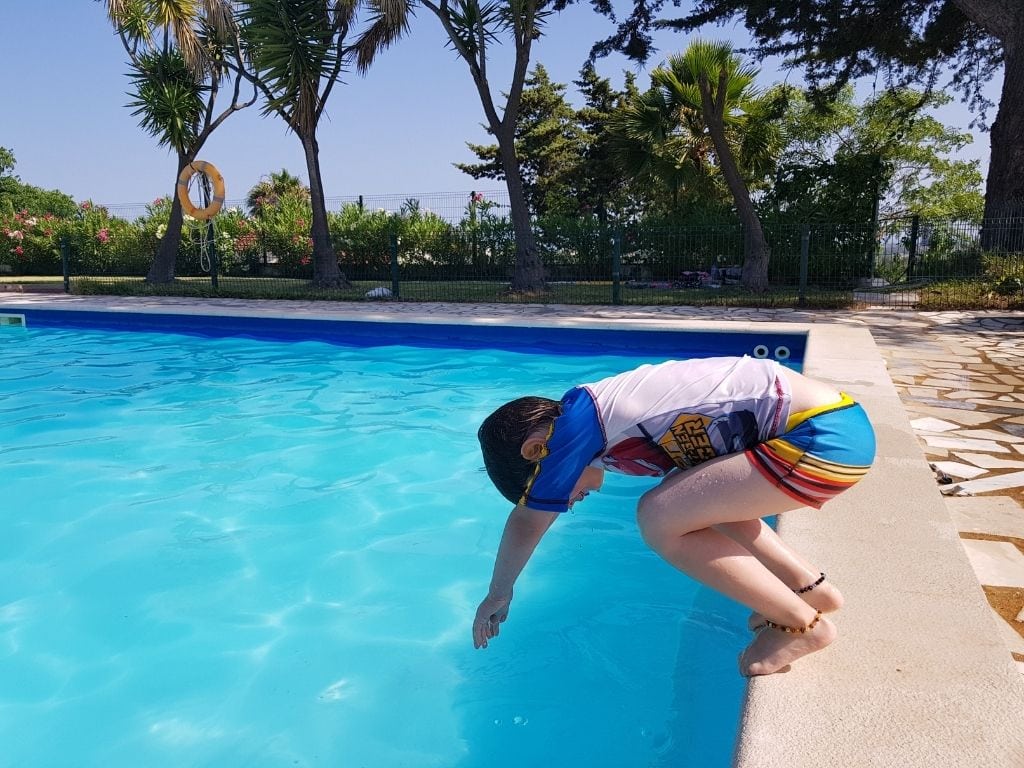
Usually it is a case of “amanhã, amanhã” meaning ‘tomorrow, tomorrow’. Who knows when it will get done.
The pace of life is far slower than we were used to and it affords my husband a better work-life balance in order to spend time with our son.
Outdoor Living
As I’ve already mentioned, outdoor living was a big factor in our decision to move to the Algarve. Realising you are always saying no when your child asks “can I go out and play” because it is raining again isn’t any way to live as a parent.
Having the option to go outside whenever you want, play in the sun (although not during the middle of the day in summer), swim in the pool, ride a bike, the things kids should be enjoying, only became an option for us when we moved.
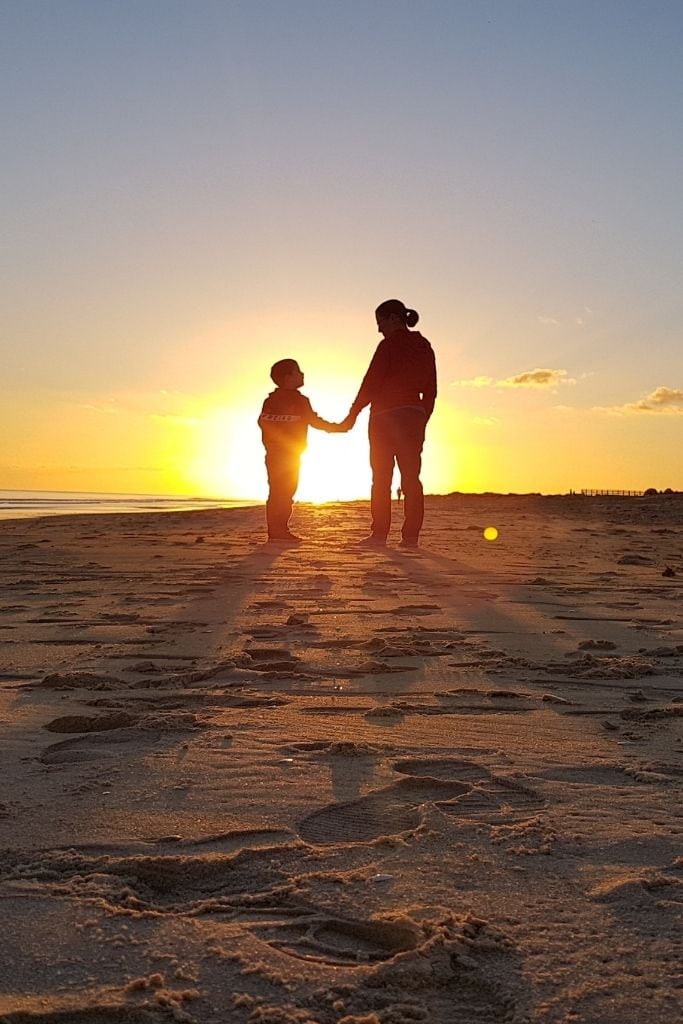
The difference having blue skies overhead to your quality of living is huge.
And having space for an outdoor BBQ, a big table to gather around with friends, and a seating area outside is just amazing.
The Beaches
Another thing that is a huge pro to living in the Algarve is your proximity to the sea. Even at the upper border of the Algarve and the Alentejo, you are only just over an hour to the nearest beach.
And there are a lot of them in the Algarve. From the East to the West, sandy beaches are far and wide.
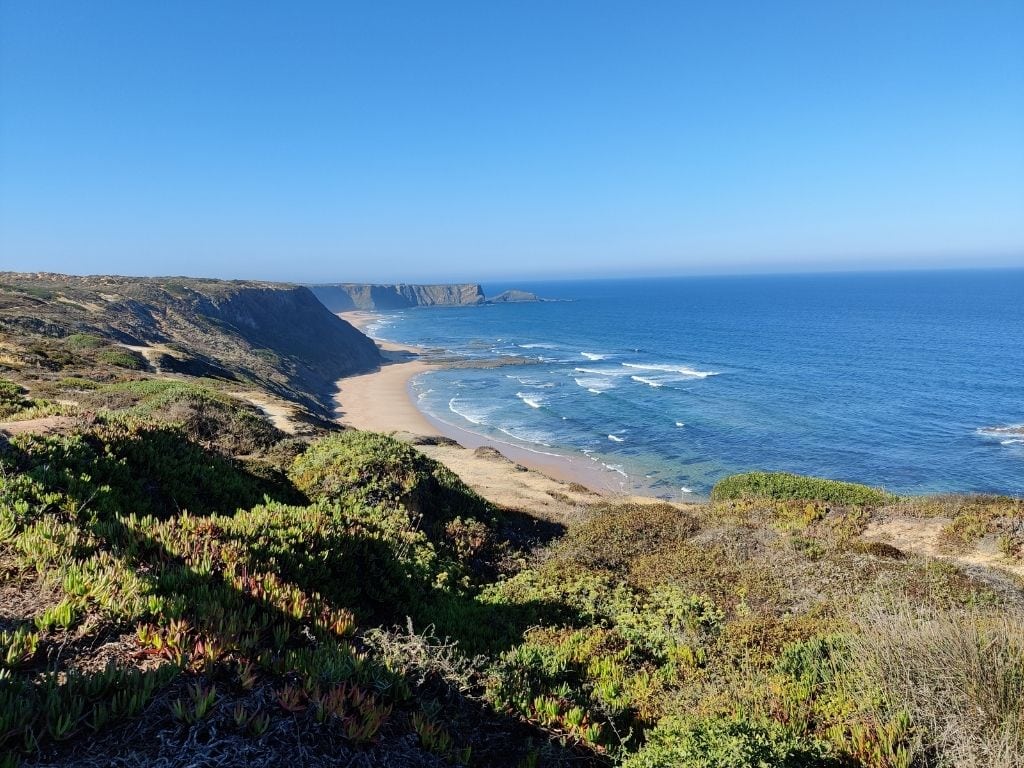
Along the west coast and southwest coast of the Algarve, there are stunning cliffs that surround the sandy beaches. The ones in the west are a haven for surfers such as around Aljezur.
In the East Algarve we have the Ria Formosa natural park and stunning sandy beaches that stretch for miles. You can walk from Vila Real de Santo Antonio all the way to Cacela Velha along the beach if you wanted to.
Festivals
The Portuguese love their festivals, and they celebrate them in style. It is a great way to enjoy the culture and get involved with local communities.
Throughout the year there are different festivals, typically starting with Carnival on Shrove Tuesday. The biggest carnival parade in the Algarve is held in Loulé and it is a must-see if you are visiting around that date.
Each town and municipality also have their own alongside the national ones and Tavira goes all out for the festival of São João in June by decorating the town with flowers.
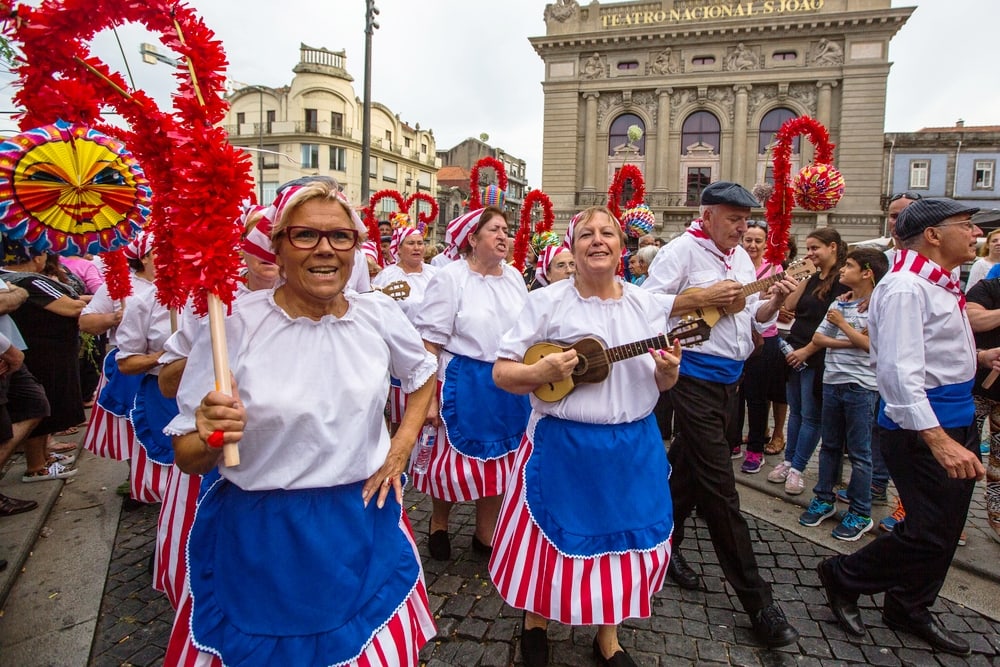
And, New Years’ Eve is a big event on the festival calendar with concerts taking place before each town and city set off their fireworks.
In 2022 we saw the New Year in at 11pm by watching the Ayamonte, Spain fireworks from our rooftop terrace, and at 12am we watched the fireworks displays across the coast stretching from Vila Real de Santo Antonio to Monte Gordo, Manta Rota and we even saw a sliver of the ones in Tavira.
Food
For me, the food is another pro to living in the Algarve. For some expats, Portuguese food is not to their taste but for me, it’s a big plus.
My absolute favourite is a simple grilled sea bass and the fresh sea bass we get in local restaurants is simply divine.

I am also a huge fan of a well-cooked Bacalhau à Brás and of course, Portugal would not be Portugal without its Pastel de Nata pastries.

Coffee
Now, this pro is one my husband loves. Personally, I do not drink coffee but my husband reliably informs me that the best coffee is Portuguese coffee.
He is left disappointed whenever we are travelling outside of the country and orders a coffee. He says it is nothing like the Portuguese coffee.

So, if you enjoy a good cup of coffee, Portugal is where it is at, apparently.
That said, I do love the café culture and sitting outside on a warm day enjoying a cup of tea and the aforementioned Pastel de Nata.
Location in the Schengen
Living in the Algarve and being within 1 hours’ drive to Faro Airport means we have easy access to other parts of Europe. If we drive to Lisbon, then more destinations open up.
And for those of us lucky enough to have a European passport (amen to our Irish passports), we can travel within the Schengen area with relative ease.
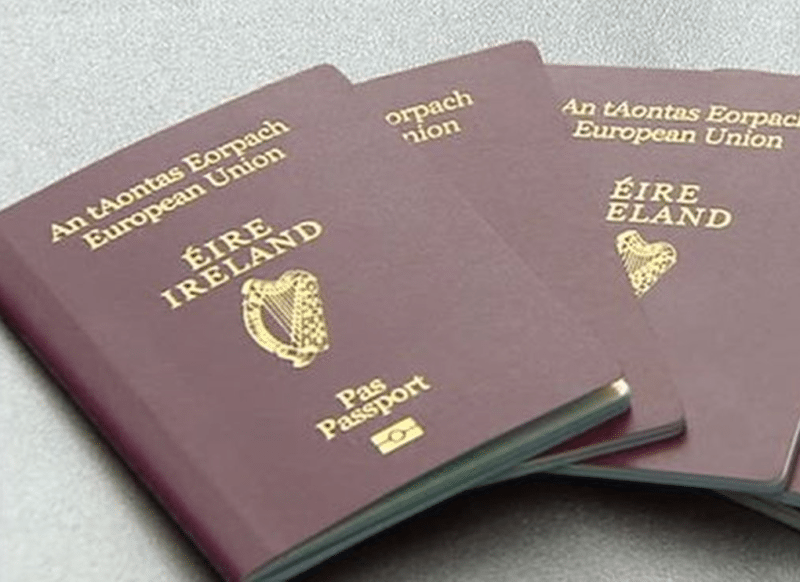
I still find it so funny in Faro Airport that there are two directions for the departure gates, one for Ireland and the UK with passport control, and one for Schengen passengers without passport control.
I do like catching the SEF officers off-guard by speaking to them in Portuguese!
Quality of education in Portugal
Portugal is known for its quality education system, and the education system in Portugal emphasizes critical thinking and problem-solving skills, preparing students for future challenges.
However, private education in Portugal also thrives, providing an alternative option for families seeking specialized and personalized education for their children. Private schools in Portugal offer smaller class sizes, enabling more individualized attention and tailored teaching methods. Additionally, private schools often have a wider range of extracurricular activities and facilities, allowing students to explore their interests beyond academics.
They are hugely expensive and costs mount with fees, lunches, transport, uniforms (public schools do not require uniforms), books (since they do not use Portuguese books) and activities are all payable. And not all private schools have good reputations. The local one in Tavira has very mixed reviews and I would never consider sending my son there.
For us as a family, a big pro for us that comes with living in the Algarve is the public education system.

Our son entered a local pre-school aged three and a half and has been in the public system ever since. We did this soon after arriving so he could start learning the language.
Six years later he is in his fourth year of primary school, fully bi-lingual and doing very well.
Public schools are free of charge, we only pay for school lunches (low-income families can receive this at a reduced cost or free).
School textbooks are free, provided by the government, and this year our local câmara (council) reimbursed families the cost of the workbooks which are the only thing aside from stationary that parents need to pay for.
In our area of the East Algarve, the school bus is available to those who live more than 2km from school.
Swimming lessons once a month are provided free of charge and after-school activities are also free of charge. These consist of hour-long classes that range from physical education to music, drama, arts and crafts, and even language lessons.
And our local school has such a good reputation that children from across the border in Spain are commuting every day to attend the school.
That’s not to say all public schools are the same but for us, we are very lucky that our one is very good.
Rich Cultural Heritage
Portugal has a rich cultural heritage that is deeply rooted in its history and diverse influences. The country’s unique position on the Iberian Peninsula has allowed it to absorb and assimilate various cultures, resulting in a vibrant and diverse cultural landscape.
From the ancient Lusitanians to the Roman and Moorish invasions, Portugal has been shaped by a multitude of civilizations. This historical tapestry is reflected in its architecture, literature, art, and music. The beautiful cities of Lisbon, Porto, and Coimbra are home to numerous historical landmarks, such as stunning palaces, castles, and cathedrals.
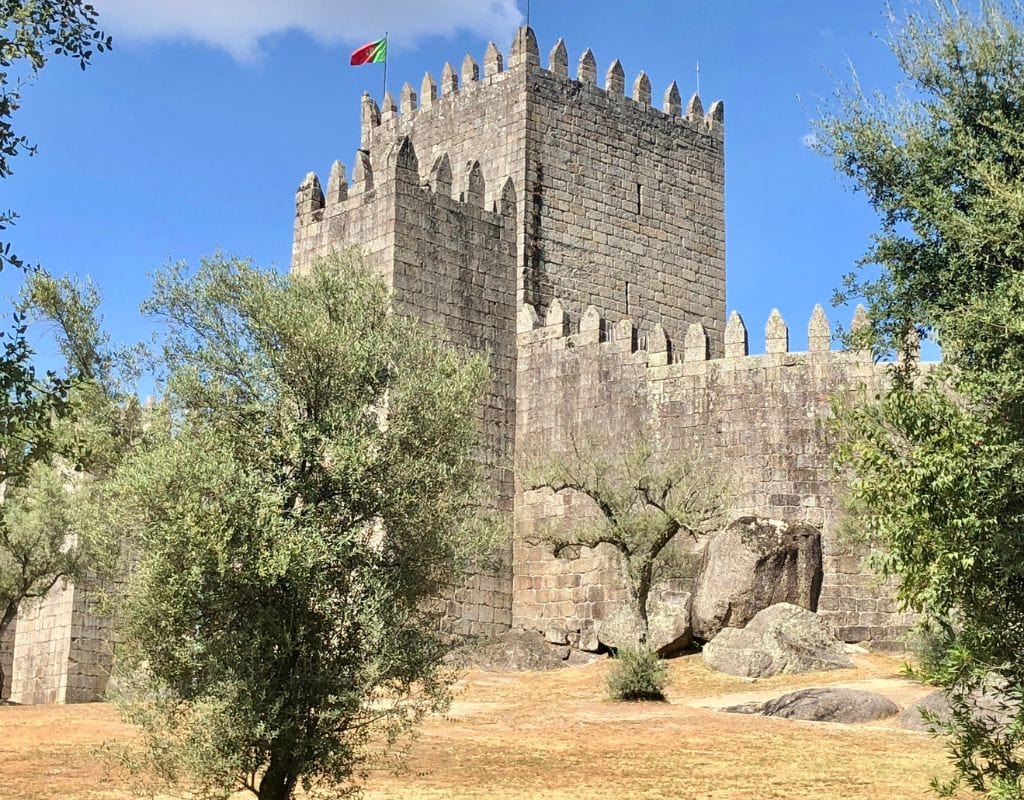
Portuguese literature, with notable writers like Fernando Pessoa and José Saramago, has garnered international recognition. The country’s traditional music, Fado, evokes a deep sense of melancholy and emotion. Additionally, Portugal’s UNESCO World Heritage sites, such as the historic center of Évora and the Monastery of Alcobaça, further showcase its rich cultural heritage. Overall, Portugal’s cultural heritage is a testament to its vibrant past and serves as a source of pride for its people.
Affordable Cost of Living
The lower cost of living is another reason many people choose to move to Portugal. Compared to other Western countries, the cost of living in cheaper. The standard of living for expats means that you can retire in Portugal and live comfortably on your Western income or pension.
That said, it is even cheaper if you don’t have a mortgage or children, which is why the Algarve is highly sought after by retirees.
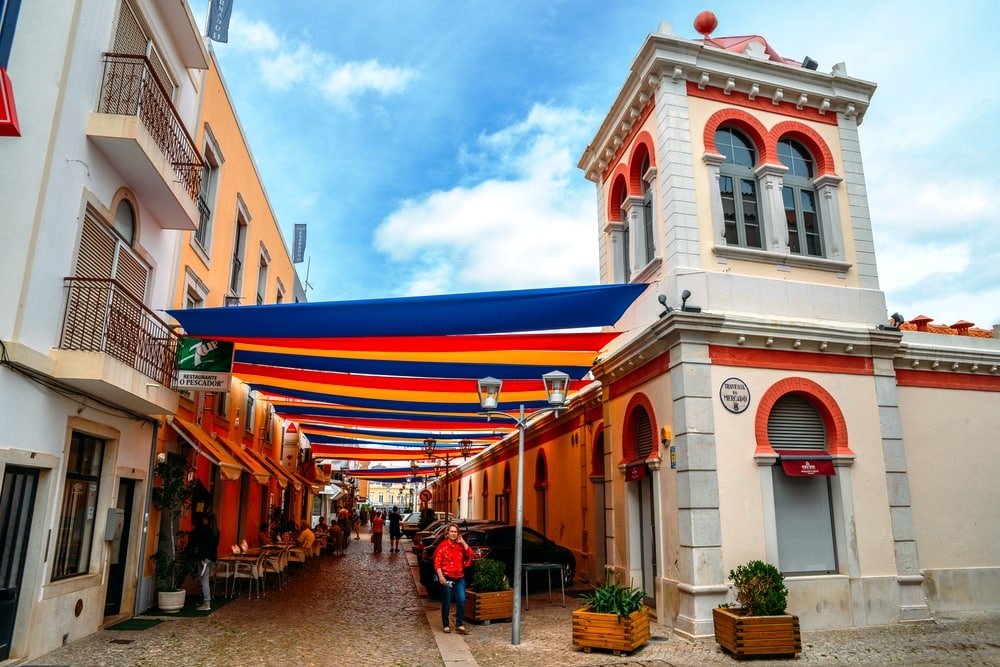
Eating out is far cheaper than, for example, in Ireland. Every time we return home to visit family and explore the far corners of the Emerald Isle, we are shocked at the prices of eating out, even for something as simple as a cup of tea and a slice of cake!
In certain cases, shopping, utility bills and other expenses work out cheaper when compared to other countries.
The Opportunity to travel within Portugal
As avid travellers, we love nothing more than packing our bags and jetting off, but a great advantage to living in the Algarve is we have everything Portugal has to offer explorers right on our doorstep.
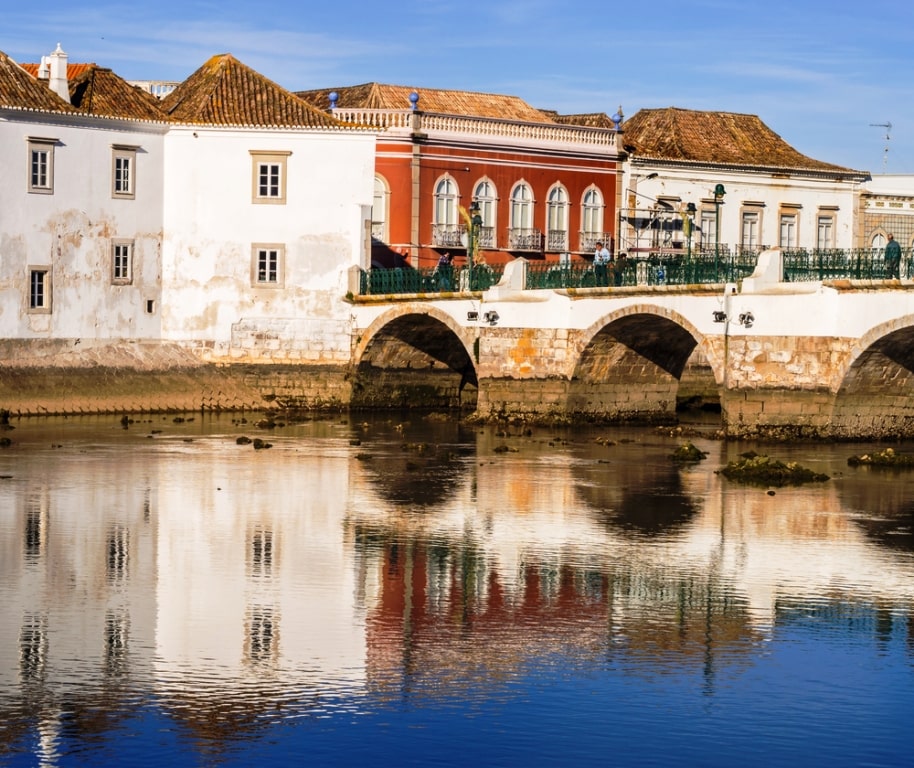
One thing I’ve learned since leaving Ireland is not to take anything for granted. While we grew up in Ireland, we hardly ever explored the country and now we return every year to travel to a new-to-us corner of Ireland to explore it fully and share it with our son. Showing him his heritage is hugely important to us.
And with that in mind, we also travel within Portugal at least once a year, either visiting one of our favourite parts of the Algarve, Aljezur, or heading north and visiting places such as Marvão, Guimaraes, Óbidos or Evora.
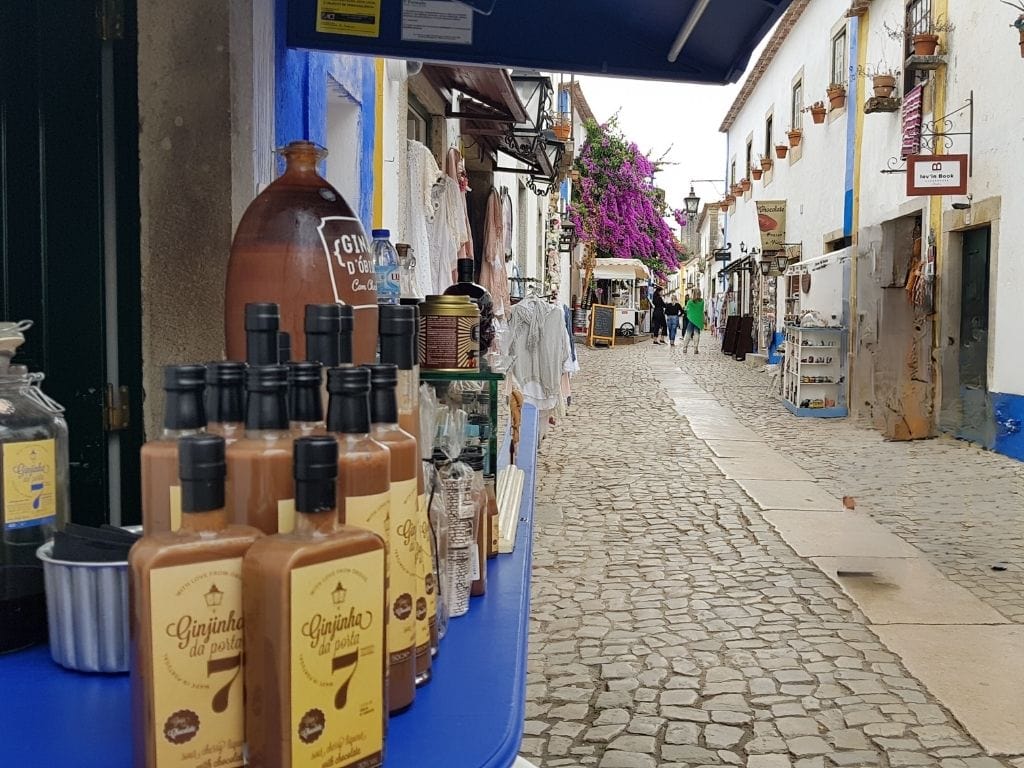
The country is so different the further north you travel that you could be forgiven for thinking you are in a different country.
Greater use for a summer wardrobe
One of the best pros and cons of Portugal and one of my favourite things about living in the Algarve is the greater use for a real summer wardrobe.
Before moving to Portugal, I would never have worn dresses, shorts, or skirts, but now my wardrobe is filled with them.
There is a definite need for having both a winter and summer wardrobe and believe me, we still wear winter coats even in the Algarve during January and February especially.
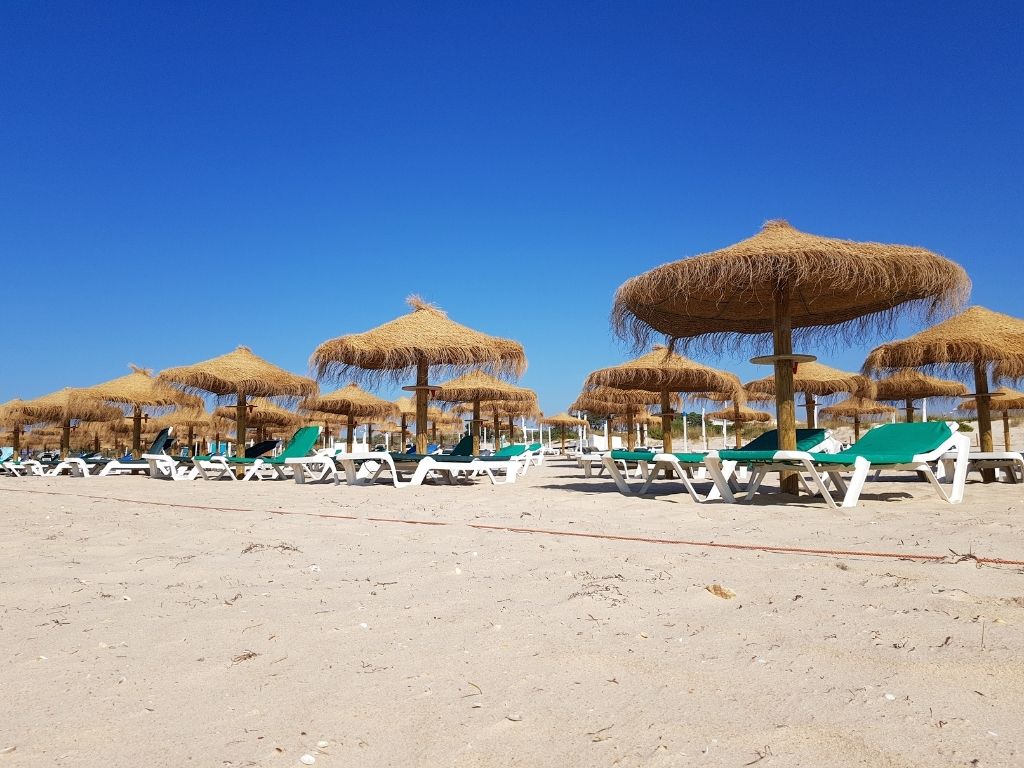
But it does sometimes mean I have no idea what to wear in Ireland when we travel there as we are definitely acclimatised to the Portuguese climate and so summer days in Ireland can sometimes feel like a spring day in Portugal.
But being able to put on a dress on a lovely sunny day is just the best feeling for me.
Cons of living in the Algarve
Language – English is widely spoken but….
Although this in no longer a con for me, I felt the need to include it under this heading as it is something that other people considering a move to the Algarve need to know.
Many people think ‘oh, but everyone speaks English in the Algarve so we don’t need to learn the Portuguese language’ but that is wrong in my opinion and experience.Maybe in the West Algarve it is more true with a larger British population living there but this has not been the case in the East Algarve.
English is widely spoken in Portugal, particularly in the major cities like Lisbon, Porto, and of course the tourist areas of the Algarve. In other parts of Portugal, English is less widely spoken but it still won’t take long to find someone that speaks English.
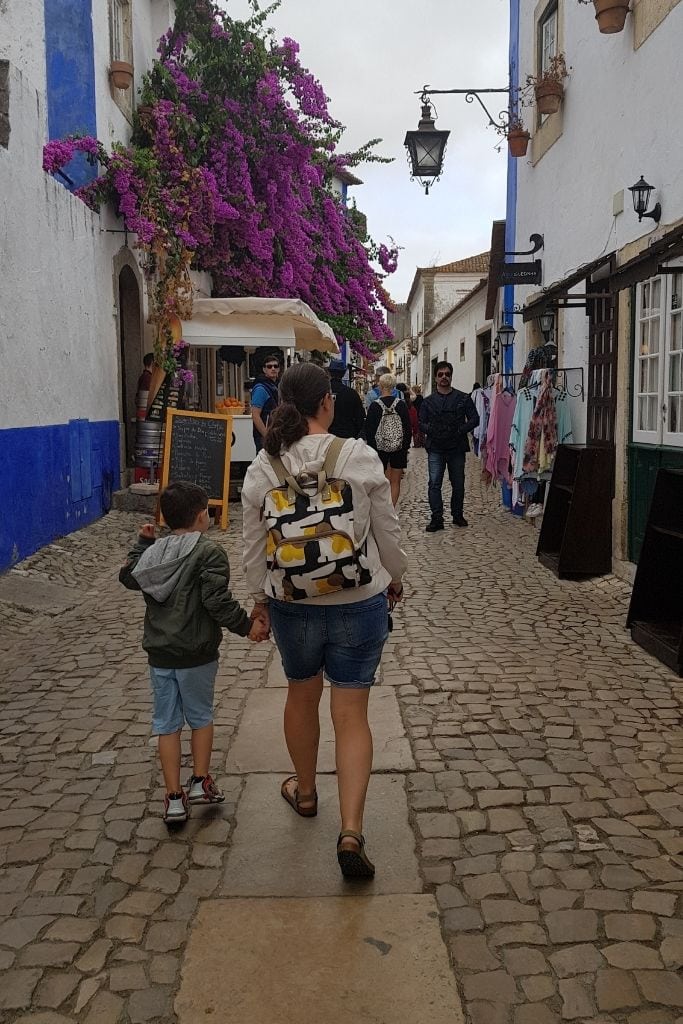
From teachers, to doctors, to orthodontists, to speech therapist and more, not everyone in the Algarve speaks enough English to have a proper conversation and be fully understood.
And even those who do have some English can sometimes feel shy or uncomfortable using what little they have.
Yes, those in the service industry such as in cafes and restaurants generally have good English and if that is your only contact with Portuguese then you’ll be fine. But in the general outside world, we have had to use Portuguese and hence learn the language.
And it is not an easy language to learn, even the locals will tell you this. But when they hear us speaking Portuguese, they are surprised first and then very appreciative second that we are making the effort. And with this, they will go out of their way to try and help us.
Public Health Care
For us, the public healthcare system shocked us. Sure, it is a far cry from the system in the US but the public health system, like so many countries is on its knees and if you have the option, going with private health insurance is the only way forward.
In early 2019, my husband had a motorbike accident and was brought to Faro Hospital with a broken leg. He was told he would need surgery and maybe could have it in a week’s time.
He was left on an A&E ward for more than 12 hours with no pain relief and food or water. The next morning, he rang our health insurance company and was transferred to the private hospital and had his surgery the next day. And it was like a 5-star hotel in comparison.
We have had horrible experiences in our local health centre and as we are fortunate enough, we go to a private doctor now for any checkups or health problems. Maybe it is just that one local health centre, but we avoid it at all costs.
We have friends who have had positive experiences with the public health system but that was only after getting early tests privately.
Work Opportunities
One of the big disadvantages of living in Portugal is the limited job opportunities. This is a big con to moving to the Algarve or Portugal in general is the lack of good work opportunities.
With the Algarve economy being largely based around tourism, many of the jobs are in the tourism sector and are not very well-paid. And you often need to know the language to gain employment.
In certain circumstances, the job might only be available during the tourist season between April and October and where does that leave people.
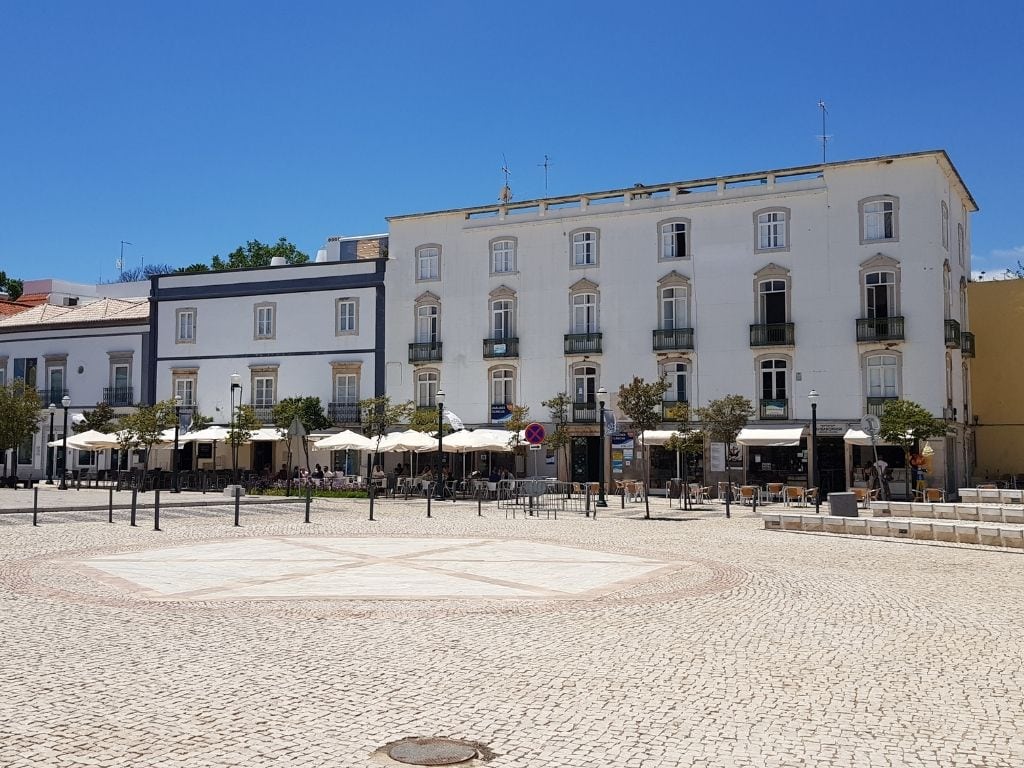
We are among the few that are lucky in that my husband works remotely in a well-paid position working for a global company, so this is not a big worry for us. But we do worry about our son’s future and whether it is in Portugal or not.
Portuguese salaries are considered low in Western Europe and the average salary in Portugal is around 2750 EUR or 2676.42 USD. Portugal is known for its relatively low tax rates, making it an attractive destination for expats looking to live and work abroad. As an expat living in Portugal, one can benefit from a wide range of tax advantages. Portugal has a progressive tax system, which means that the tax rates increase as income rises.
Taxes on wages in Portugal and the Portuguese tax regimes.
However, even the highest tax brackets in Portugal are still lower than in many other European countries, but in the Algarve salaries and minimum wage is lower than in many other areas of Portugal.
Tourists
I am going to sound like a snob now, but tourists are a con to living in the Algarve at certain times of the year.
For those in the West Algarve, it is the influx of British and Irish tourists during Easter, school mid-term breaks and during the summer.
For those of us in the East Algarve, it is the influx of Portuguese tourists from Lisbon and the north, and Spanish tourists.
Roads become a lot busier as do supermarkets, and you must prebook a table at your favourite restaurant during July and August as it is next to impossible to just show up without a reservation.
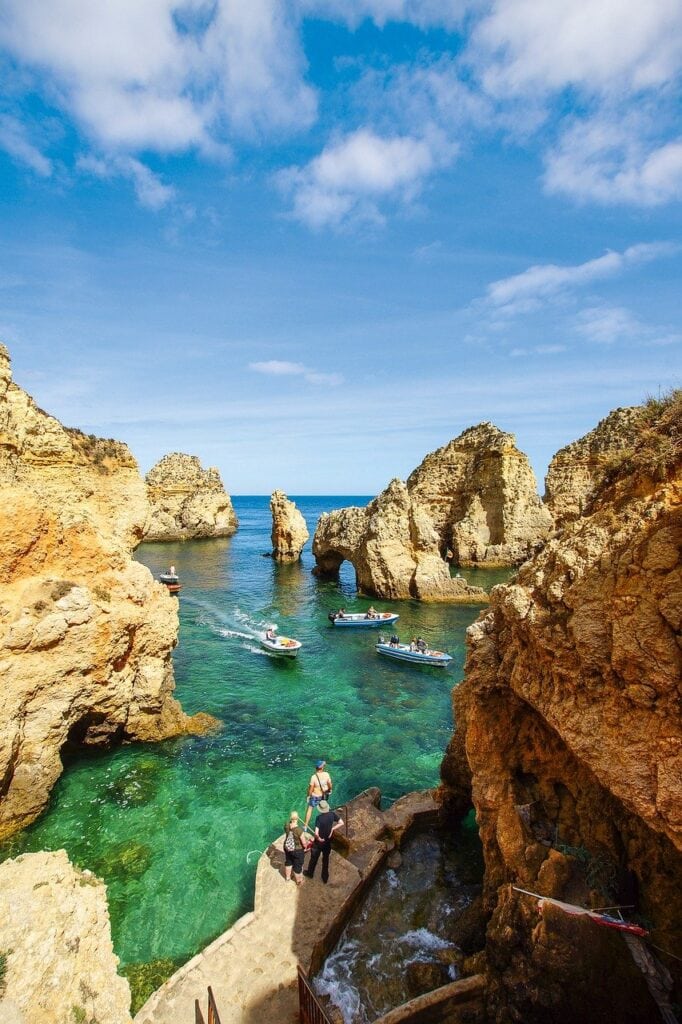
Beaches get busier as well, so we tend to avoid going to the beach during July and August.
And after the summer, local councils often give out warnings about the drought situation where water is concerned due to the low rainfall we get and increase in usage during the summer.
Driving in Portugal
Something that can be a hug con to living in the Algarve for nervous drivers is the poor driving standards.
My husband and I consider ourselves good drivers but are constantly shocked at some of the crazy manoeuvres some drivers make on certain roads, especially the EN-125 which runs from the east to the west.
There are always accidents on that road, and many are due to stupid overtakes in cars that don’t have enough power to make it before the oncoming car arrives.
Drivers also tend to drive right up to your back bumper and stay far too close to the cars in front of them.
Cost of cars
And speaking of driving, the cost of cars is shockingly expensive.
This was something my husband investigated before we moved and lead to us importing our car from the UK when we moved as the same car in Portugal was hugely expensive.
Second-hand cars are almost as expensive as new cars, and the market seems crazy to us compared to the UK or Ireland.
High-end cars are also far more expensive than they are in other countries due to what we feel is the double taxing of them.
And for those, like us, who choose to import their car, the road tax is more expensive than the same Portuguese-registered car as the government treat them as if they are new and so often, they get put into a high tax bracket.
So, for anyone thinking of moving to the Algarve or anywhere else in Portugal, do your homework where car purchases are concerned and prepare to have a far less fancy car than you might be used to if buying one in Portugal.
Customer Service
This may not be a con for some, but it is for others and so for this reason I put this here.
In some cases, customer service can be good in Portugal, but many of our experiences has been that it is poorer than in Ireland or the UK.
The laid-back approach is one factor while the language barrier can be another. Remember the amanhã approach already mentioned. Sometimes it can actually be infuriating when you need to get help quickly or get something done in a hurry.
Some companies just don’t do good customer service and we have found government departments less than helpful with certain problems we’ve tried to sort out.
Thankfully, our local Finanças office (tax office) is a great one but the one attached to our previous municipality was terrible. And Faro IMT for exchanging or updating your driving license is another one we avoid at all costs.
Cost of Housing
A big disadvantage to moving to the Algarve is the cost of housing. Both from a buyer and a renter’s perspective.
Rental accommodation long-term is hard to come by because although some landlords advertise long-term rental, what they actually mean is October to May and they want you to vacate for the summer so they can rent the property out for more money during the busy summer months on a weekly basis.
This means that ordinary people such as nurses, doctors and teachers who are placed in the Algarve are left without affordable accommodation for a good part of the year.
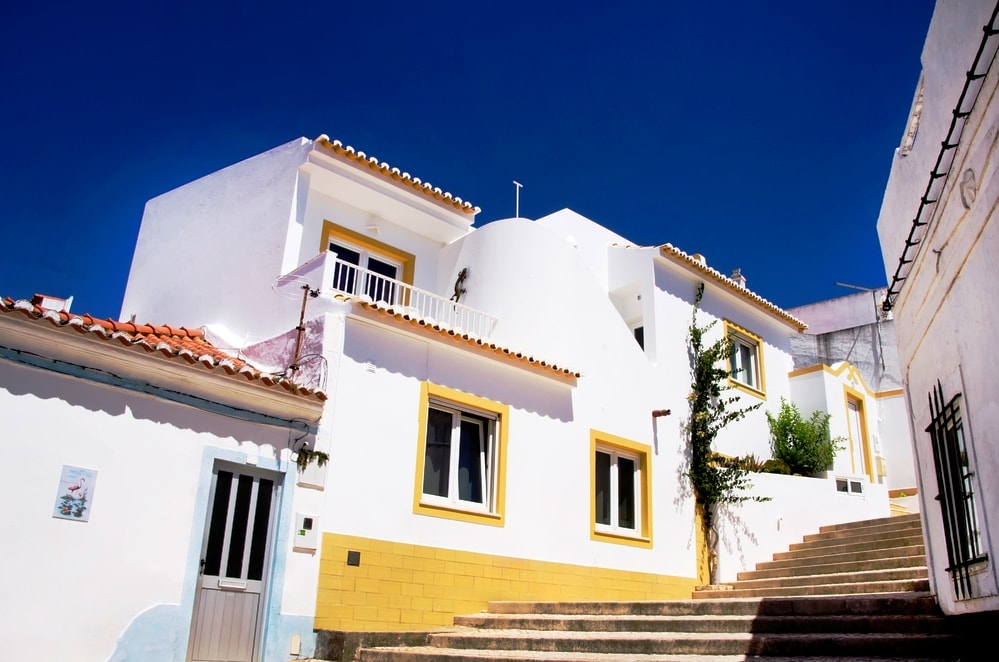
And then there are the expensive house prices for buyers. When we started looking at houses to buy when we were ready, we started at one budget and soon realised that for what we needed, we needed to adjust that budget upwards.
We ended up buying a house 30% more expensive than we originally budgeted for because we had certain requirements. And then there was the 30% deposit we needed because we were still on our 5-year temporary residency permit and not a permanent one, something we were never warned about.
Add to that the stamp duty and solicitors’ fees and it soon becomes a very expensive process very quickly. If you are lucky enough to be a cash-buyer then it is easier, but having to get a mortgage means it gets trickier.
House prices in the Algarve have continued to rise in the six years we have been living in Portugal and unless you want a ruin to redevelop or have lots of disposable cash, you may need to adjust your expectations.
Transportation in the Algarve
We have said this, and so have Portugues friends of ours, that if you want to live in the Algarve and get around easily, you need a car. There is no avoiding it.
Public transportation is not great and far behind the rest of continental Europe in the Algarve, and it is severely lacking in most places outside of Lisbon and Porto.
It shocked us if I am honest. Aside from the depths of the countryside, getting around Ireland without a car is easy or manageable, whereas here in the Algarve it is near impossible.
There are some buses between the towns, but these can be few and far between. The trains need updating and can often run late. And if you live outside of the main towns, there are no public transport links to those towns for you to get around. So, you have to have a car just to get around.
Portuguese Bureaucracy and Public Services
Oh, the trials and tribulations of paperwork in Portugal.
Something that can be a con to living in the Algarve and Portugal is the bureaucracy when it comes to paperwork, applying for anything or changing your details with government departments for example.
You arrive at one office with what you think you need to complete an application or a process only to be told they need ‘this paper’. You go and obtain said paper, only to be told at the original office they need ‘another paper’ from somewhere else. And this doesn’t just happen to foreigners, it also happens to locals.
Even opening a bank account, they needed all original documents to both photocopy and to scan and send to Lisbon for approval. There must be boxes upon boxes of photocopied documents in every office of every type in Portugal.
I learned very quickly after moving here to file all important documents and pieces of paper in what we’ve come to call the blue folder. It has everything from our residency papers to social security number papers, to household bills and even our sons school reports, and if we ever need to go somewhere to change details or make an application, it comes with us.
It hasn’t failed us yet. And yes, we’ve even, unexpectedly, needed our son’s school reports for something at our local câmara.
Portuguese winter months
Something that can surprise some people when they come to live in Portugal are the winters.
The north gets a lot of rain and even snow, while here in the south, the houses are not built with the winter in mind.
Although Portugal can have mild winters those winter coats I had donated when leaving Wales were soon replaced in our second year as we started becoming acclimatised to the cold December to March months. Winter woollies, coats and jeans replace the dresses and skirts that feature for a large portion of the year.
When we eventually bought our house in 2021, we got the keys at the end of November and moved in just before Christmas. And we were freezing!
We got an enclosed wood fire with a fan installed to try and heat the living room and were buying bags of wood on a regular basis. We bought electric blankets for our beds and in the new year made the decision to do external insulation at a high cost to try and prepare for the next winter.
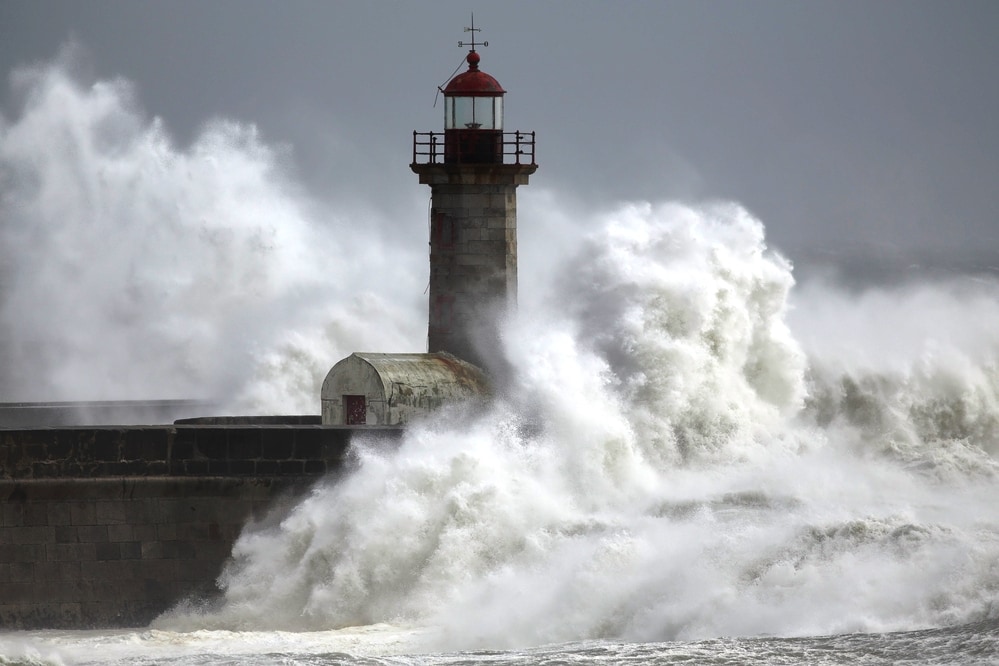
The houses, especially in the south, are built for the hot summers in mind and are often cold and damp during winter. The Portuguese wear extra layers and central heating is not commonplace in the country as it is in Ireland and the UK.
This year we also replaced all our old double-glazing doors and windows in another effort to keep the winter at bay. And by the end of September, we had already begun stockpiling wood for the coming months.
Portugal is often only thought of as a warm country and while yes, this is true during summer and winter days are not as cold as winter days in Ireland, it does feel cold after a few years here, it does rain and you need to be prepared for that.
Getting a Portuguese Visa
As Irish passport holders we are considered members of the EU and as such don’t have any financial or other requirements for life in Portugal.
If you are planning to move to Portugal as an expat from America, Canada or now the UK, you will need to obtain a Portuguese visa for your permanent residence. This will allow you to live and work in Portugal legally. There are several types of visas available depending on your situation. The most common visa for expats is the Temporary Stay Visa, which is valid for one year and can be renewed.
To apply for this visa, you will need to have a job offer from a Portuguese employer or proof of sufficient funds to support yourself during your stay. Another popular option is the Non-Habitual Resident Visa, which is designed for individuals who want to retire or live in Portugal while benefiting from favorable tax rates. To apply for this visa, you will need to have a source of income outside of Portugal and not have been a tax resident in Portugal in the past five years.

Whichever visa you are applying for, it is important to start the process well in advance, as it can take some time to gather all the necessary documents and submit your application. It is also worth noting that the requirements and procedures may vary depending on your country of origin. Therefore, it is advisable to consult with the Portuguese embassy or consulate to find out the specific requirements for your situation.
Digital Nomad Visa for Portugal
The new D8 Digital Nomad Visa was introduced at the end of 2022 and completely changed how many people were applying for residency in Portugal.Portugal has recently introduced a Digital Nomad Visa, making it an attractive destination for expats looking to live and work remotely. This visa allows individuals to relocate to Portugal and work for a foreign employer or provide services to foreign clients, without needing to establish a physical presence in the country.
The Digital Nomad Visa provides a great opportunity for those who wish to experience the vibrant lifestyle and rich culture of Portugal while continuing to earn a living. Living in Portugal offers numerous benefits, including a high quality of life, affordable cost of living, and a favorable climate. The country offers a favorable tax regime for freelancers and remote workers, enabling them to maximize their earning potential.
An American expat in Portugal
If you are an American planning to move to Portugal as an expat, there are several factors to consider, including the amount of income you need for a Portuguese visa. The income requirements vary depending on the purpose of your move and your specific circumstances. Generally, if you are retired or have a consistent source of passive income, such as investments or pensions, you need to prove that you receive at least the Portuguese minimum wage, which is currently around €665 per month.
On the other hand, if you plan on working in Portugal, the income requirements may differ. In addition to proving that you have a job offer or a contract, you need to demonstrate that your salary meets the minimum wage standards in Portugal for your specific profession. It is important to consult with the Portuguese consulate or embassy to ensure that you meet the necessary income requirements for your visa application.
Portugal Golden Visa
This year the Portugal Golden Visa program was ended as part of a wider package of measures to tackle a housing crisis in the country,
Was it worth it moving to the Algarve?
For us, yes. Along with other factors, and with Brexit changing the contractor situation in the UK, 2017 was the right time for us to leave. Our son was still young enough for it not to be a big upheaval and my husband continued working as he always did.
We got to spent two precious years living close to my Mum before she passed away and still have my dad staying with us every now and then, even though he is just down the road from us.
There are some huge pros to living in the Algarve but there are also cons. Should those cons put people off? No, not in my opinion.
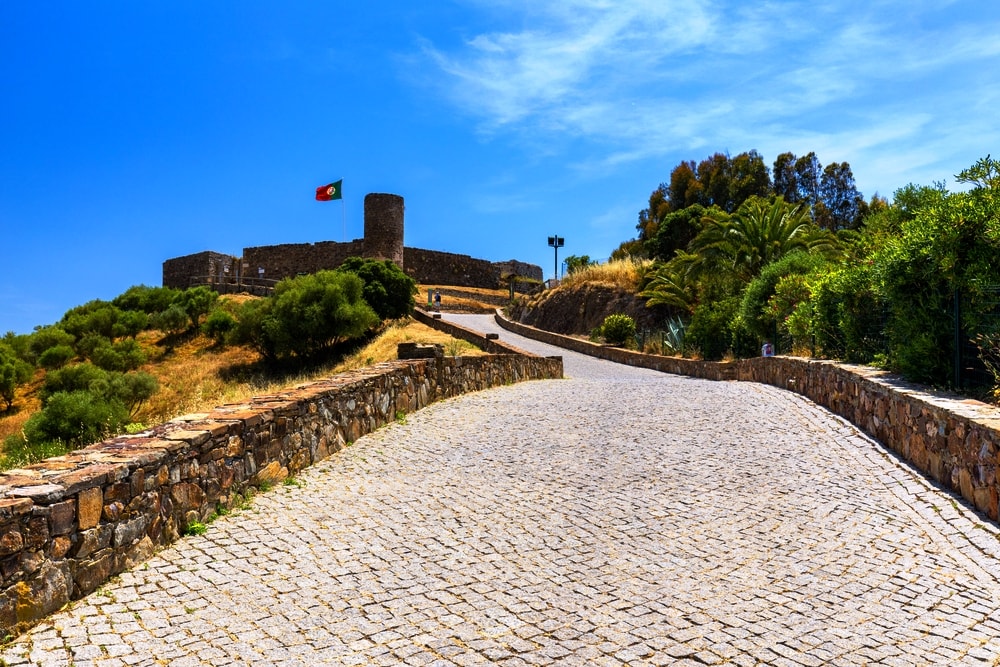
The Algarve is an amazing place to bring up kids and we have friends who were living in London and returned to Portugal to bring up their son.
It is safe, clean, has a good education system and the beaches and outdoor living cannot be surpassed.
Is the Algarve our forever home? I don’t know, never say never. We never thought we’d leave Wales for Portugal, so you never know what the future holds. One thing I can tell you is that if we do ever move for school or work reasons, we have every intention of retiring to our house in the East Algarve.
Discover the Pros and Cons of Living in Austria
Pros and Cons of Living in Barcelona
49 Things to know about the UK before you visit
Buying a plot of land in Ireland: How to buy property
Pros and Cons of Living in Cyprus
How to get an EU passport and get EU citizenship
How to retire in Ireland a complete guide to moving here
Move to the UK as a Canadian or American
20+ Pros and Cons of Living in Spain
The Pros and cons of living in Sweden and moving here
Pros and cons of living in Canada by a Canadian Immigrant
Pros and Cons of Living in Mexico
Pros and Cons of Living in France
Pros and Cons of Living in UK: Expat Life in England
